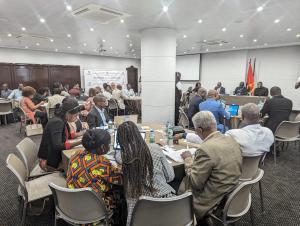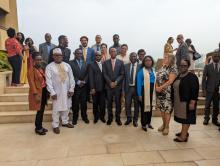Angola's Health Preparedness Assessed by International Body
In a bid to strengthen global health security, the World Health Organization (WHO) has concluded a comprehensive assessment of Angola's readiness and response to health threats. This initiative, the Joint External Evaluation (JEE), took place between 25th and 29th September 2023.
A key component of the International Health Regulations (IHR) introduced in 2007, the JEE forms part of a wider framework by the WHO to monitor and evaluate nations' health capabilities. This tool assesses countries' capacities, allowing them to refine their technical expertise, inform national action plans for health security, and mobilise essential resources.
Thirteen evaluators from Spain, Mozambique, Portugal, São Tomé and Príncipe, and international bodies carried out the assessment in collaboration with 60 Angolan experts from various ministries.
The evaluation focused on three core areas: prevention, detection, and response capacities, under the "One Health" umbrella. It sought to address areas such as antimicrobial resistance, zoonotic diseases, food safety, and vaccination in the realm of prevention. For detection, the country's laboratory systems, surveillance mechanisms, and human resources were scrutinised. Meanwhile, emergency health management, public health and security interconnections, health service provision, and risk communication were considered under response capabilities.
Key findings revealed that Angola has improved significantly since the 2019 assessment. There is now better coordination with partners, has appointed an official National IHR Focal Point, and is in the process of validating a National Health Security Action Plan for 2022-2026.
Angola has demonstrated significant capacity for improvement. However, efforts are still underway to strengthen, in particular, areas such as training human resources in the animal and human health sectors and the management of health emergencies.
Recommendations put forward are varied and robust. They include upgrading the National Health Security Action Plan, integrating animal and environmental health components, enhancing human resource training across all health sectors, and developing standard operating procedures.
Going forward, the WHO emphasises the need for Angola to convene a meeting of all stakeholders to set out priority plans, establish an effective system for implementing and evaluating IHR-related initiatives, and engage in multi-sectoral exercises.
In conclusion, while Angola has made improvements in fortifying its health security, certain areas require attention. The WHO remains unwavering in its support, recognising the nation's commitment to enhancing not just its health landscape, but also its contribution to global health endeavours. This evaluation, while reflecting past and present efforts, will undoubtedly guide future health security actions and collaborations.

